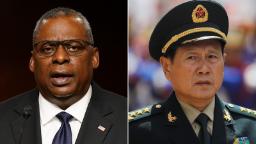
Singapore
CNN
—
US Defense Secretary Lloyd Austin and Chinese Minister of National Defense Gen. Wei Fenghe held their first face-to-face meeting on Friday at a major defense summit in Singapore.
The meeting at the Shangri-la Dialogue took place during Austin’s fourth trip to the Indo-Pacific region after a formal request from China’s military leadership.
The meeting lasted nearly an hour, just under twice the scheduled 30 minutes. Prior to the meeting they had spoken only once on the phone in late April in a call that lasted approximately 45 minutes.
According to a Pentagon readout of the meeting Austin, reiterated that the US “remains committed to our longstanding one China policy.”
“Secretary Austin discussed global and regional security issues, and reiterated to General Wei that the United States remains committed to our longstanding one China policy, which is guided by the Taiwan Relations Act, the Three U.S.-China Joint Communiques, and the Six Assurances. The Secretary reaffirmed the importance of peace and stability across the Strait, opposition to unilateral changes to the status quo, and called on the PRC to refrain from further destabilizing actions toward Taiwan,” the readout said.
The two also discussed the need to maintain open lines of communications, according to the readout. “Secretary Austin discussed the need to responsibly manage competition and maintain open lines of communication. The Secretary underscored the importance of the People’s Liberation Army engaging in substantive dialogue on improving communications during crises and reducing strategic risk,” it said.
A Chinese government spokesman said the meeting was “candid’ but “positive and constructive.”
“The Chinese side thinks it is better to meet than not to meet and it is better to talk than not to talk,” Senior Colonel Wu Qian said at a news conference after the meeting.
Before the meeting, a US defense official said Washington would try to establish lines of communication at the highest levels of the militaries as a mechanism to avoid situations that would result in conflict between the two Pacific powers. The US also wants to see communication mechanisms between commanders at the theater level, officials said.
“This has been a priority for us in the defense relationship,” the official said.
The US has frequently called out what it views as China’s growing aggression in the region, accusing the People’s Liberation Army of unsafe and dangerous activity, particularly around the South China Sea and Taiwan.
Australia – one of America’s closest allies in the Indo-Pacific – condemned Beijing when a Chinese fighter jet released chaff and flares near an Australian surveillance plane late last month.
At the same time, China has been vocal in its condemnation of relations between the US and Taiwan.
After a congressional delegation visited Taiwan late last month, the Chinese Embassy in Washington urged the US to “avoid sending wrong signals to the ‘Taiwan independence’ separatist forces,” according to a statement from the embassy. That same week, China sent 30 warplanes into Taiwan’s air defense identification zone, the highest daily figure in four months.
“The Taiwan issue will figure prominently in all of the secretary’s conversations,” the senior defense official said.
Austin is scheduled to address the conference in one of the keynote speeches at the Shangri-La Dialogue on Saturday morning, followed by a speech by Wei on Sunday morning.

